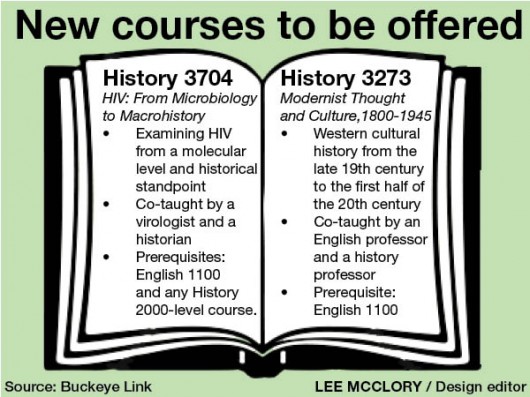Ohio State is offering two new, cross-disciplinary, team-taught courses for undergraduates come Spring Semester.
History 3273: Modernist Thought and Culture, 1880-1945 and History 3704 HIV: From Microbiology to Macrohistory.
The College of Arts and Sciences organized the creation of these two courses.
Both classes will be taught by two professors from different departments. History professor Stephen Kern and English professor Brian McHale will teach History 3273, and associate professor of microbiology Jesse Kwiek and assistant professor of history Thomas McDow will teach History 3704.
Kern and McHale plan to highlight revolutionary developments that include physics, philosophy, visual art, music, dance and literature, according to a university web page about the courses.
The two professors will center the class on thinkers like Sigmund Freud, as well as literary works from writers such as James Joyce and Virginia Woolf, Kern said.
The class format will involve the two taking turns leading the lectures, while the other provides comments about the lecture to spark a discussion with the entire class, he said.
McHale’s lectures will be more literature-based, while Kern’s lectures will be more history-based.
The era in which the course is based on might be the richest era in cultural history — something Kern and McHale said makes the class interesting.
“This period, let’s say 1900 to 1940, is arguably the most dynamic period culturally in all of recorded history — except for maybe the Renaissance,” Kern said.
McHale encourages students to enroll in the class because the type of cross-disciplinary course it’s set to offer is not a typical experience.
“It’s not that often that you get an opportunity to engage in a kind of dialogue between different disciplines,” McHale said.
He said this course has a couple levels of interests that can apply to different types of people.
“It has these two different levels of interests: anybody who’s got any inclination at all, any interest at all in the early 20th century, there’s that, and then, anyone who is interested in the way intellectual life is organized, there’s that level, too,” McHale said.
Although prerequisites include English 1110 and any 2000-level history course, all students have to do if they are interested in taking it is get permission from either Kern or McHale.
History 3704 will look at how HIV has evolved from a molecular standpoint as well as the global evolution of the virus from a historical angle.
Kwiek and McDow will be present for every lecture and will try to promote a class-discussion atmosphere where all students can voice their thoughts and understand a particular topic from multiple perspectives, McDow said.
Kwiek imagines this class will follow a timeline, so to speak, that always circles back to HIV.
“I think the idea is to move chronologically and cover the basic concepts, always coming back to the common thread of HIV, though, which can’t be just considered just from the virology perspective or the history perspective,” Kwiek said. “It’s a virus that happened in human context.”
One reason Kwiek is looking forward to teaching the class is because of all the different viewpoints the students will bring.
“You’re bringing in 60 different perspectives than the one you have, and people will always think about it differently,” Kwiek said.
Kwiek also hopes the class allows students to sift through any misinformation on websites and other mediums and become well-informed on the topic.
“One of the things we strive for as well is to give the students confidence to sort of pick (the misinformation) apart and be critical of the arguments that are there and maybe so that they themselves can become the science communicators in the family or someone that is just comfortable recognizing the faults and the arguments and confronting them,” Kwiek said.
McDow said the course is not ordinary.
“It’s kind of set up to attract intellectual risk takers. It’s not just a standard course. It’s not a course that you could have done before. It’s not a check-the-box kind of course,” McDow said.
Prerequisites for the course include any English 1110 course and any 2000-level History course. Students can also have either Kwiek or McDow give them permission to take the course.
Both courses came about because of an initiative implemented in late spring by the College of Arts and Sciences executive dean and vice provost David Manderscheid.
Manderscheid said in an email that the idea to have cross-disciplinary courses was identified during the strategic planning process in the College of Arts and Sciences.
“The proposals for courses were reviewed by the College of Arts and Sciences curriculum committee,” Manderscheid said. “They made recommendations to me and I made the final decision.”
As far as future courses like these two, Manderscheid said there is a lot of interest within the College of Arts and Sciences to have more interdisciplinary courses. He also said there is another call for proposals currently.
As of Tuesday night, History 3704 had filled its 60 spots and there are five students on the wait list. History 3273 had 13 out of 40 seats filled.
McHale is confident that more of these multi-disciplinary, team-taught courses will be available in future semesters.
“This spring is really just the thin edge of a wedge and I reckon we’ll see more of them in the semesters to come,” he said.



